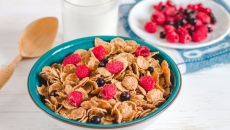New Delhi, Sep 4 (IANSlife) Just as the chapters of our lives unfold, so do the dietary requirements that support our well-being. It is important to be acquainted with the intricacies of nutrition tailored to different decades and the essentials of what to eat in your 20s, 30s, 40s, and beyond.
"Maintaining proper nutrition is essential at every stage of life. As we age, our dietary needs change, requiring adjustments to our eating habits to ensure optimal health and well-being. From the energetic 20s to the seasoned 40s and the graceful golden years, our bodies evolve significantly, and so do our nutritional necessities. Each stage presents unique challenges and opportunities, demanding a unique approach to sustaining health, energy, and vitality. As we navigate through the ever-changing landscape of life, understanding how to nourish ourselves appropriately becomes a powerful tool in enhancing longevity and improving quality of life", says Dietitian Yashika Dua, a Consultant, at Artemis Lite in Sec 82 Gurugram.
So let's dive into the nutritional requirements for individuals in their 20s, 30s, 40s, and beyond, and gain valuable insights into what we should eat to support overall vitality and longevity outlined by Yashika Dua.
The Roaring 20s: Building a strong foundation
In our 20s, our bodies are still in their prime, and good nutrition forms the ground for a healthy future. People in their 20s should eat a balanced diet that includes all major food groups: lean proteins, whole grains, healthy fats, fruits, and vegetables. Calcium-rich foods like dairy products and leafy greens aid in attaining peak bone mass, which is crucial in the 20s. Omega-3 fatty acids found in fatty fish, flaxseeds, and walnuts must also be consumed as they are essential for brain health and may help in reducing inflammation.
Thriving 30s: Sustaining energy and wellness
As we step into our 30s, our metabolisms begin to slightly slow down. In the 30s, we should focus on maintaining a healthy weight and supporting sustained energy levels. Complex carbohydrates like quinoa, brown rice, and sweet potatoes provide long-lasting energy. Adequate protein intake becomes essential to preserve muscle mass, especially for those leading active lifestyles. In the 30s, incorporate a variety of colourful vegetables and fruits to draw benefits from a spectrum of vitamins, minerals, and antioxidants.
Fabulous 40s
Prioritising heart and bone health, entering into the 40s brings about changes in hormone levels and a gradual decrease in muscle mass. Heart health demands prime focus in the 40s, so opt for lean protein sources like poultry, fish, beans, and legumes. Healthy fats from sources like avocados, nuts, and olive oil support cardiovascular well-being. Consume adequate fibre as it aids digestion and helps maintain cholesterol levels. Also, focus on calcium and vitamin D-rich foods to promote bone health and prevent osteoporosis.
Beyond 50s: Nourishing for longevity
As we move beyond our 50s, our bodies require even more care to maintain vitality and prevent age-related problems. Keep protein intake consistent to prevent muscle loss. Consider incorporating plant-based proteins like tofu and tempeh, which may have additional health benefits. Omega-3s continue to play an important role in brain health, and foods like walnuts, chia seeds, and fatty fish remain valuable. Hydration becomes more important, as the sensation of thirst tends to diminish with age.
Golden years and beyond: Adaptation and enjoyment
In the golden years, nutritional needs become highly individualised. Caloric requirements may decrease, but the need for nutrients persists. Adequate fibre, obtained from whole grains, fruits, and vegetables, helps in combating problems like constipation and supports gut health. Antioxidant-rich foods like berries and leafy greens can contribute to reducing inflammation and supporting the immune system.
The common thread: Hydration, moderation, and mindfulness
Irrespective of age, some principles remain constant. Hydration is essential for all stages of life; drinking sufficient water supports digestion, circulation, and overall bodily functions. Portion control and moderation help in managing weight and preventing overeating. Practising mindful eating, which involves paying attention to hunger cues and savouring each bite, fosters a healthy relationship with food and helps in maintaining good health.
Nutrition is a lifelong journey, and each stage of life brings its own set of nutritional requirements. From building a strong foundation in your 20s to nourishing for longevity in your 50s and beyond, a well-balanced diet plays a pivotal role in maintaining overall health and wellness. By making informed dietary choices and adapting to the changing requirements at each stage of life, individuals can enjoy robust health throughout their lives. You can also consult with a healthcare professional or registered dietitian to personalise your nutritional approach based on individual health conditions and goals.






